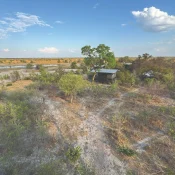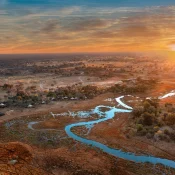
POACHING AND BUSH MEAT TRADE THREATEN ZIMBABWE’S WILDLIFE AND TOURISM
The Victoria Falls Anti Poaching Unit (VFAPU) recently highlighted the escalating crisis of poaching in their operational area, underscoring the immense pressure faced by wildlife and the dedicated individuals striving to protect it. Their recent address emphasized that safeguarding Zimbabwe’s natural heritage is a collective responsibility, fueled by community support and a shared commitment to conservation.
In a stark assessment of the broader continental challenge, VFAPU also drew attention to the burgeoning bush meat trade, dispelling the notion that it is solely confined to regions like South Africa’s Kruger National Park. They asserted that this illicit industry is rapidly expanding across Africa, including within Victoria Falls itself, posing a significant threat to ecological diversity and the overall health of wild spaces. If left unchecked, this trend carries catastrophic implications for the continent’s invaluable natural heritage.
The economic drivers behind the bush meat trade are alarmingly evident. VFAPU reported encountering instances of entire buffalo carcasses being sold for as little as US$100 for hundreds of kilograms of meat – a price significantly lower than that of legally sourced meat in butcheries. This stark price disparity, coupled with the ease and regularity with which snares can be manufactured and deployed, presents an immense challenge for anti-poaching efforts. The accessibility and low cost of these poaching methods contribute to the daily growth of this destructive practice.
The consequences of unchecked poaching and the expanding bush meat trade are far-reaching, particularly for Zimbabwe and the wider African continent, where wildlife forms the cornerstone of thriving tourism industries. The decimation of animal populations directly impedes the natural growth of wildlife, disrupting delicate ecosystems and reducing the biodiversity that attracts tourists from around the globe. Iconic species, crucial for maintaining ecological balance and tourism appeal, are increasingly vulnerable to poaching syndicates driven by profit.
The decline in wildlife numbers translates directly into a diminished tourism product. Tourists are drawn to Africa by the promise of encountering diverse and abundant wildlife in their natural habitats. As poaching erodes these populations, the allure of African safaris and wildlife viewing experiences diminishes, leading to decreased tourist arrivals and significant economic losses for communities and nations reliant on tourism revenue. This not only impacts national GDP but also jeopardizes livelihoods linked to the tourism value chain, including those in hospitality, tour operations, and local crafts.
VFAPU’s sobering assessment also highlighted a critical disparity: the resources allocated to combatting poaching are not increasing at the same rate as the escalating threat. This resource limitation severely hampers the effectiveness of anti-poaching units and other conservation efforts, leaving vast areas vulnerable to illegal activities. The appeal from VFAPU for increased support underscores the urgent need for greater investment in anti-poaching initiatives, including enhanced funding, improved technology, and increased boots on the ground.
Addressing the poaching scourge and the bush meat trade requires a multi-faceted approach involving strengthened law enforcement, community engagement, education, and addressing the underlying socio-economic factors that drive these illegal activities. Without a concerted and adequately resourced effort, the continued decimation of Africa’s wildlife will not only lead to irreversible ecological damage but will also severely undermine the potential for sustainable economic growth through tourism, jeopardizing the natural heritage for future generations.
All Categories
Recent Posts
Kazuma Safari Camp –
Kariba’s Kumabirira Lodge Is The Perfect Hideaway
Contact Us
+263 789 532 918




